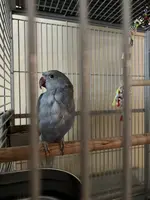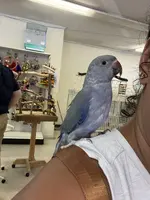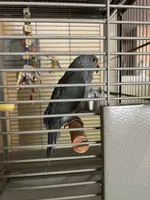Welcome to the forums!!
Oh wow, your new ringneck is a gorgeous color! How is she adjusting at home so far? It can be normal for them to be acting off the first day or so, but I think it's always good to ask questions when you aren't sure.
I adopted my African Ringneck in the spring - I was totally new to ringnecks, and had never had a parrot of my own, so I know exactly how you feel!
My parrot started his first full molt (that I've seen) in July and looked absolutely awful! He
was actually sick when I adopted him (I knew it at the time) and had gotten better, so I was super worried when he started looking so terrible! Thankfully his feathers looking all ragged and crazy are just how he looks when he molts. With his coloring he also gets really dark looking patches on his face, but now that his feathers are in he's nice and green again.
I'm not super familiar with the different IRN color mutations and how their beak color might change from the baby color, but my bird's beak started looking really flaky and cracked in places when he molted, even though there wasn't actually a crack. I know that some Indian Ringnecks can have black on their beaks as part of their coloring that might change or might not with age, so that by itself wouldn't necessarily be worrying in an IRN that isn't the wild type green - yours having a mottled black/red beak might be totally normal for her.
With my parrot, the things that
were signs of illness - he had brown staining on the feathers above his nares (the nostril type holes at the top of his beak) because of moisture from a respiratory infection - your bird looks she has nice blue feathers there, and nice clear nares with no evidence of being plugged up or having any drainage.
Mine also had redness in his eyes where they should be white, and his irises weren't very clear - see how your bird has grey eyes around the black pupil? You couldn't see that at all with mine.
There are of course illnesses that we don't see symptoms of easily, so it's always recommended to take a new pet to a vet for a wellness check when you bring them home. They'll look at her all over, including inside her mouth to check her crop looks healthy, check her weight, and can give you a good idea of how she appears overall.
We have a list of Avian Veterinarians on the forum (just click the blue text to get there):
Avian Vet Resources
It's also recommended to weigh your parrot at least once a week - even daily if you're worried - and most people recommend doing this in the morning after she has her giant morning poop but before she eats. I have a cheap digital kitchen scale from Target/Walmart type store - you can put a little plastic tub on it, zero it out, then have her sit inside, or use a perch laid across it - there are lots of ways to do it. I've read in a lot of places that the first sign of illness is often weight loss, and sometimes it's the only way we find out that things are wrong.
Please ask any other questions you can think of; that's what we're here for!
Also - does she have a name yet?

Again - Welcome, and I hope you'll keep us updated!




